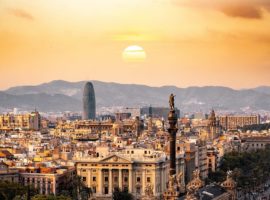You’re one lucky person if you are planning on moving to Italy! This culturally rich country is home to some of the most picturesque places on earth, with history in every alleyway. Is it easy to move to Italy? What documents are required and what steps are needed before moving? What is the cost of moving from the UK to European countries, particularly Italy, after Brexit? Prepare your removal with this practical guide for relocating to Italy.
Navigate this article faster
How Much Is Moving to Italy from the UK?
The average cost of moving to Italy from the UK is between £800 and £3000.
In the table below you can find an estimate of the moving prices for moving to Italy from the UK, for an average house or an apartment:
Shipping containers and road transport are the best way of moving from the UK to Italy. This is the most practical and economical solution for removal to Italy.
| House Size | 20ft Shipping Container | 40ft Shipping Container |
|---|---|---|
| 1-2 Bedroom Flat | £800 – £1,349 | £1,630 – £2,059 |
| 3-5 Bedroom House | £1,150 – £1,550 | £2,128 – £2,628 |
Ready for the Dolce Vita?
Make the first move and grab your quotes here.
What Factors Make up Your Italy Moving Quotes?
Removal firms typically offer a base price, which can vary based on several key factors tailored to your specific moving needs, such as:
- Distance: Costs increase with distance and home accessibility.
- Your Moving Date: Avoid peak times like vacations and month-ends for lower rates.
- The Volume of Your Items: Charges based on weight and lorry/container size.
- Optional Moving Service Add-ons: Consider the specific services you might need for your move to Italy, such as packing, cleaning, and special handling, and budget accordingly based on the typical price ranges for these services. Here’s the ballpark:
| Service | Removal Cost (Per Hour & Per Packer) | Cost Per Hour (2 Hour Minimum) |
|---|---|---|
| Disassembly and Reassembly | Help with assembly / disassembly of furniture | £125 |
| Storage | Space if you cannot move immediately | £30 per week |
| Cleaning | Cleaning of old and new house | £15 per hour |
| Parking Permit | Ability to park in front of property Price depends on area and trade association membership | £30 – £75 |
| Piano Removal | Proper care and specialist equipment for safe removal Remove and replace doors or windows for access | £120 – £480 |
What Is the Cost to Live in Italy?
While the cost of living in Italy can be lower than in the UK, this varies by region and city. Purchasing power also differs, offering a unique financial landscape for expatriates. Below is an average comparison of some daily expenses:
| Item | Italy | UK |
|---|---|---|
| Milk | €1.20 | £0.91 |
| Cinema | €9 | £10 |
| Restaurant | €20 menu | £26 menu |
| Gym | €45 | € 29 |
| Bus | €1.50 | £2.50 |
Housing Expenses in Italy
The price of rental accommodation varies according to the location more or less close to the city centre, an indication of the prices observed below. Note that rents can be much more expensive in big cities, almost + 50 to 70% in Rome and Milan compared to the rest of Italy for example.
Remember to check that the rent is charges included when signing the contract. Furthermore, do not be surprised if you are asked to pay the rent quarterly and not monthly.
| Cities | Studio | 2 rooms apartment | 3 rooms apartment |
|---|---|---|---|
| Rome / Milan | 400-500€ | 1000-1500€ | 1500-2000€ |
| Other cities | 200 – 300€ | 300-800€ | 700-1500€ |
Formalities & Must-Dos for Your Italy Relocation
Prepare your international move well to avoid unpleasant surprises on arrival. You can rely on a qualified moving company which can guide you through the flow of administrations and the required procedures. Below you find more information that will help you prepare for emigrating to Italy:
1. Moving to Italy After Brexit
According to the UK Government’s website, there are agreements in place for UK nationals already living or planning to move to the mainland countries of the European Union.
Choose a moving company familiar with post-Brexit regulations for British citizens. They can offer detailed advice and support with documentation like the duty-free import request for your belongings.
2. Residence Permit
As a British citizen, you must apply for a residence permit from the Police (Questura) within 8 days of your arrival on the territory (for a stay of more than 3 months). Given the complexities introduced by Brexit regarding the status of UK nationals living in or moving to EU countries, consider the following steps for the most accurate and timely information:
- Visit Official Websites: The Italian Ministry of Foreign Affairs, the UK Government’s living in Italy guide, and the local Questura (police headquarters) websites often have the latest requirements and procedures regarding residence permits.
- Ask an Immigration Expert: For complex situations, or to ensure you’re fully compliant with current laws, consulting with an immigration lawyer might be beneficial.
- Consult with Your Moving Firm: Consider reaching out to a professional international moving company experienced in UK-to-Italy relocations by requesting your quotes below. Your removal provider can provide you with any specific advice and assistance you may need.
Visa Types in Italy
To stay in Italy for over 90 days, you need a National Visa (D-Visa), depending on your reason for moving. Common types include:
- Work Visa: Requires a job offer in Italy.
- Study Visa: For students over 18 enrolled at an Italian university.
- Retirement Visa: For retirees who can financially support themselves.
Additionally, the Italy Golden Visa is a residency by-investment scheme available to non-EU citizens, including British nationals, which allows for travel within the Schengen zone.
Check the Italian Visa information page to know more about it.
3. Navigating Italy’s Tax System
You are considered a tax resident in Italy if you have your main residence there or if you live more than 183 days in the year in Italy. Income tax is levied at source and is calculated according to a progressive scale based on your annual gross income. The tax declaration is individual and cannot be joint, even for couples (married or not).
Additionally, the Italian tax code (codice fiscale) is necessary for various financial transactions, including opening a bank account, where it must be presented along with your ID to meet Anti Money Laundering requirements.
4. Opening an Italian Bank Account
The documents required to open a bank account in Italy are the tax identification number, proof of address and an identity document. Some British banks have their subsidiaries in Italy or benefit from a partner network, which can facilitate your procedures.
5. Parking Permits For Italy
Italy’s traffic is notoriously challenging, with numerous restrictions, particularly in major cities. It’s crucial to research parking permits well in advance of your move. Determine whether you require an OSP or ZTL permit to access restricted traffic zones.
6. Traffic Authorization for Special Areas
You must request special authorization from the borough of your neighbourhood if you move to the historic centre. This can correspond to an amount of 300 € to 600 €.
Connect with Expert Removers
Steps to Settle in Italy After Your Move
So, you’ve made the leap and your move to Italy is near—Bellissimo! Now, let’s walk through the must-dos to get you properly settled in your new Italian life. It’s not just about unpacking boxes; there are a few key steps left to do to ensure you’re fully integrated into the Italian system.
Here’s the lowdown on the list of paperwork and registrations you need:
- Residence Certificate
- Tax Code (Codice Fiscale)
- Registration with the Local Health Authority (Azienda Sanitaria Locale, ASL)
1. Request Your Residence Certificate
To live in Italy for more than three months, you must register with the civil registry (Anagrafe) of your new local municipality. This applies to everyone, including students on short or long-term exchanges. Depending on your status, you’ll need to provide:
- Employment proof for workers.
- Student ID for students.
- Proof of private health insurance if currently unemployed.
Additionally, securing a temporary residence permit is necessary before you can apply for a permanent residence permit.
2. Tax Identification Number
A tax identification number (Codice Fiscale) is essential for you and each family member. It’s needed for various transactions in Italy (e.g., opening a bank account, getting a SIM card, renting, etc.). Obtain it for free from the Italian Consulate General before departure or at the Agenzia delle Entrate in Italy.
3. Social Security Registration
Healthcare in Italy is free and accessible through registration with the local health agency, ASL. You’ll need to present:
- A valid ID,
- Your tax number,
- Your residence certificate,
- A civil status certificate.
Following these steps will help facilitate a smooth transition to your new life in Italy, ensuring you have access to essential services and legal compliance. Additionally, obtaining a permanent residence permit is a crucial step towards Italian citizenship, allowing you to live in Italy for a certain number of years before applying for citizenship and enjoying benefits such as visa-free travel to many countries.
4. Learning the Language
Learning the Italian language is essential for a smooth transition to life in Italy. While many Italians speak some English, especially in tourist areas and among the younger population, speaking Italian will help you navigate everyday situations, communicate with locals, and fully immerse yourself in the culture.
- Enroll in an Italian Language Course: Before your move, consider enrolling in an language course to get a head start. Many online platforms offer courses tailored to different proficiency levels.
- Use Language Learning Apps: Apps like Duolingo, Babbel, and Rosetta Stone are excellent tools for practicing your Italian skills on the go. These apps offer interactive lessons that can help you build vocabulary and improve grammar.
- Immerse Yourself in Italian Media: Watching Italian movies, listening to Italian music, and reading Italian books or newspapers can significantly enhance your language skills. This exposure will help you get accustomed to the rhythm and nuances of the language.
- Practice with Native Speakers: Try to engage in conversations with native Italian speakers. This could be through language exchange programs, online forums, or even social media groups.
- Hire a Private Tutor: If you prefer personalized instruction, consider hiring a private tutor. Alternatively, you can join group classes in Italy to continue your language education and meet new people.
5. Meeting People and Building a Social Life
Building a social network in Italy can take time, but there are several ways to meet new people and make friends.
- Join Expat Groups and Clubs: Look for expat groups and clubs that align with your interests, such as sports teams, book clubs, or hiking groups. These communities can provide support and help you connect with others who are also navigating life in a new country.
- Attend Local Events: Italy is known for its vibrant festivals, concerts, and cultural events. Attending these gatherings is a great way to meet new people and experience Italian culture firsthand.
- Take a Cooking Class or Wine Tasting Course: Italy’s rich culinary heritage offers numerous opportunities to learn and socialize. Enroll in a cooking class or wine tasting course to meet fellow foodies and wine enthusiasts.
- Volunteer for a Local Charity: Volunteering is a rewarding way to give back to the community and meet like-minded individuals. Look for local charities or organizations that need volunteers and get involved.
- Explore Your Neighborhood: Spend time exploring your new neighborhood, visiting local cafes, markets, and parks. Engaging with your surroundings can lead to spontaneous interactions and friendships.
FAQs About Emigrating to Italy
How to Move to Italy With Pets?
If you are moving to Italy with a dog or a cat, your furry darling will need to be vaccinated against rabies, carry an electronic chip, and an identification passport.
Will I Have to Learn Italian?
Learning Italian is highly beneficial in Italy, not only for enhancing your career prospects but also for day-to-day interactions. Locals here are often not very multilingual. Therefore, learning and speaking Italian is almost a requirement if you want to work and integrate into the country.
Moving to Italy With Your Family
When planning your family’s move to Italy, prioritising your location is key, especially considering the challenging economic situation locals currently face.
Navigating the School System in Italy
Younger children, typically under the age of 4 or 5, may find it easier to integrate into an Italian school, due to their adaptability at that age. However, for children entering primary school, an international school might be the preferable option to ensure a smoother transition and continuity in education.
Why Move to Italy?
Italy beckons with its vibrant culture, diverse regions, rich traditions, and culinary delights. But what exactly draws people to this beautiful country? Here are some compelling reasons why relocating to Italy might just be the perfect move:
1. A Thriving British Community
Italy is a top destination for Brits, home to an established community of around 70,000 people. The northern provinces, with cities like Milan and Turin and regions such as Lombardy and Veneto, are especially popular among new British residents.
2. The Italian Cuisine
Italian cuisine is particularly rich in regional products and specialities waiting to be discovered. A meal usually consists of a starter, a primi and secondi piatti and dolci for dessert. Water is customary in restaurants, but tipping is optional, emphasising the relaxed dining culture.
3. The Art of Coffee
From a morning cappuccino or a quick macchiato to an afternoon espresso, Italian coffee culture is renowned worldwide. Every moment of the day is coffee time in Italy, making it a daily ritual.
4. Fashion Forward
Known as the epitome of fashion, Italy is where style meets tradition. Italians place great importance on dressing well for every occasion, reflecting the country’s status as a place where style meets tradition, setting global trends.
5. Diverse Regions
Italy is a country of contrasts, with stark differences between the North and South. Each region boasts its unique identity and culinary speciality, and yes, even its own type of pasta!
6. Traditions and Family
Italy’s calendar is filled with religious and regional festivals, celebrated with gusto and often centred around family gatherings. The Italian lifestyle emphasizes strong family values and cultural traditions; it’s common for families to live under the same roof, and if this is not the case, the family is never far away!
Understanding Italian Visas and Permits
Italian visas and permits can be complex, but understanding the different types and requirements is crucial for a successful move.
- Research Visa Types: There are various types of Italian visas, including work visas, study visas, and retirement visas. Determine which type of visa you need based on your purpose for moving to Italy.
- Gather Required Documents: Commonly required documents include a valid passport, proof of income, health insurance, and sometimes a criminal background check. Ensure you have all necessary paperwork ready.
- Apply at the Italian Embassy: Submit your visa application at the Italian embassy or consulate in your home country. Be prepared for an interview and provide any additional information requested.
- Understand Residence Permits: Once in Italy, you may need to apply for a residence permit (permesso di soggiorno) depending on your visa type. This permit allows you to stay in Italy for an extended period.
Healthcare in Italy
Italy’s healthcare system is considered one of the best in the world, but it’s essential to understand how it works and what options are available to you.
- Italian National Health Service (SSN): The SSN provides free or low-cost healthcare to residents. To access these services, you need to register with the local health agency (ASL) and obtain a health card (tessera sanitaria).
- Private Health Insurance: While the SSN covers most healthcare needs, many expatriates opt for private health insurance to supplement public services. Private insurance can provide quicker access to specialists and private hospitals.
- Healthcare Services: Italy offers a wide range of healthcare services, including hospitals, clinics, and pharmacies. Familiarize yourself with the nearest healthcare facilities in your area.
- Register with a Local Doctor: Upon arrival, register with a local general practitioner (GP) who will be your primary point of contact for medical needs. You’ll need your health card and residence certificate for this process.
Working in Italy
Working in Italy can be a great way to experience the culture and economy firsthand, but it’s essential to understand the job market and requirements.
- Research the Job Market: Investigate the job market in Italy and identify the types of jobs available in your field. Websites like LinkedIn, Indeed, and local job boards can be valuable resources.
- Recruitment Agencies: Consider working with a recruitment agency or job placement service to find employment opportunities. These agencies can help match your skills with available positions.
- Work Visas and Permits: Foreign workers need specific work visas and permits to be employed in Italy. Ensure you understand the requirements and apply for the appropriate visa before starting work.
- Italian Work Culture: Familiarize yourself with the Italian work culture, including typical working hours, holidays, and employee benefits. Understanding these cultural nuances can help you integrate smoothly into your new workplace.
By following these steps and preparing thoroughly, you can ensure a successful and enjoyable transition to your new life in Italy. Buona fortuna!



